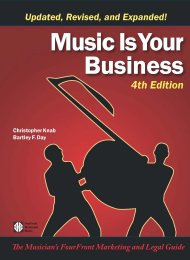Waiting for someone to discover you is the purgatory of the unimaginative soul.
I’m always on the alert for the “discover-me musician”. Here are some clues to these lost individuals operate:
-
They mail cheap-o CDR's with no contact
information. (Tip: stop with the shopping-for-a-deal idea. And when a
demo recording is requested, have a
professional looking CD ready to send.)
- After sending their music to an industry professional, they’re never heard from again. The idea
of making a follow-up call never enters their minds.
- They scribble an illegible note about having a bunch of “great songs” and want us to “get them played”, or “sign us now!”
- They’ve been recording songs for several years but never performed for a live audience.
- They send out mass e-mailings to industry people filled with cliche descriptions of their music (“monster songs that will make you rich if you just try to sell my songs for me.”)
These unfortunate discover-me addicts have no clue.
How
did this come to pass? Why are so many musicians and bands waiting in a
self-imposed twilight zone? I trace it back to Tin Pan Alley. Yup,
since the late 1890s, the income from published songs has been
controlled by a coterie of powerful songwriters, publishers, and later,
record company executives. These influential people created a system
where aspiring songwriters and would-be stars depended on their
services and connections.
Whether it was access to the
vaudeville stages, the budding recording industry, or the wonder of
radio broadcasting—if you wanted to “make it,” you had to find a way to
be discovered by those guys. Only they could open the gates to these
opportunities. Hence the term "gatekeepers.” “Come on kid. I can make
you a star!” was their pitch, and they could do just that.
But
today we live in a new music environment, and forty-plus years past the
birth of the indie revolution, the DIY (Do It Yourself) movement of the
early 1970s. Things are different now, but I still encounter hundreds
of wannabes at music conferences like the CMJ Marathon, SXSW, SXSE,
etc.
There they are, an army of discover-me drones passing out
those infamous demos with no contact information, and playing the
stupid lottery game of “Discover me, I’m really good.” Then they go
home, only to resurface at some other expensive conference to try once
again to make that one really important contact.
Let’s put an end to this foolishness, whad’ya say?
Stop
dreaming, musicians! Learn the business as you build your own career.
The gatekeepers will come, maybe, after you have something substantial
to show them; a fan following on your website or social networking
sites, a number of CDs sold, some modicum of press recognition. Then
you can decide if you actually want the almighty record deal. Or is 'a
deal' actually a series of gigantic financial hurdles that you have to
climb over in order to earn some lousy $1 to $1.50 per unit sold, after
you recouped all the advances?
Now, let me say this. You do need
connections. You do need people to help you with your career. (why do
you think Linked-In, and Facebook etc. are so popular?)
The entertainment industry is built on relationships.
The best relationships are nurtured over the years and have been built
on mutual trust and respect for the different gifts we have as
musicians and music business professionals.
As a non-musician, I
can honestly speak for myself and other non-musician gatekeepers on
this. Music business professionals have found their place by listening
to and being inspired by the great music of the past and present. We’ve
developed “ears,” a kind of inner radar for what music is “good” by our
marketplace definition. We’re paid for being able to find the right
music for the various companies we represent.
Don’t bother us with lame pleas for attention or unprofessional work habits. Prove to us that your music is cool, don’t tell us that it’s cool.
The
way you do that is to put yourself in places where we can hear your
music, read about it, and pick up the buzz from the excitement of your
growing fan base. In this competitive age, you need to do more than
just write some songs and send out demos.
You’re not the only one who has a dream of being successful, of making money with your music career. Music
professionals also want a long career doing what we love to do. Should
our paths meet, and should the chemistry work between us, our success
could include working to help you succeed.
Industry representatives like to discover new talent, but they like to discover it on their own terms.
Build
relationships based on a working knowledge of the business you’re
entering, and cultivate a respect for the business side of things.
Draw our attention, but do not demand our attention.
The
best relationships are those that honor the gifts and talents of the
creative person and the business professional. When that type of
relationship is sought after and established, only then we can say that
someone discovered a new act and made someone a star.



